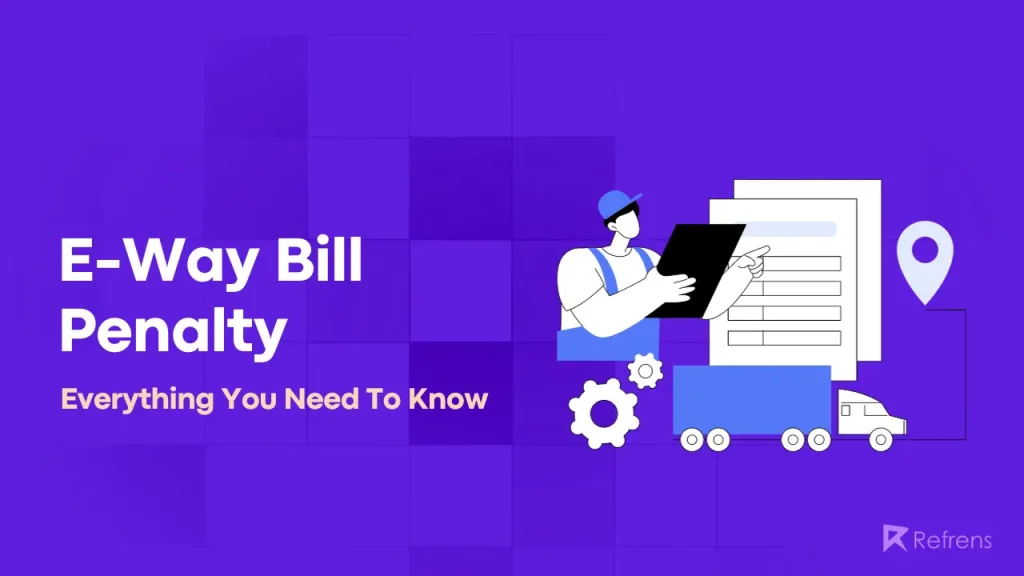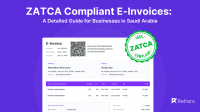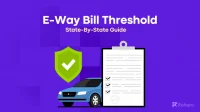What is e-way bill?
An e-Way bill is mandatory for transporting goods worth more than INR 50,000. This document must be generated by all registered persons or transporters before starting the transport, as per Section 68 of the Goods and Services Tax Act and Rule 138 of its associated rules
The e-Way bill system was implemented to promote GST compliance and deter tax evasion. It facilitates the efficient movement of goods, reduces transit time, and brings transparency to logistics operations. Moreover, it improves accountability by enabling effective tracking of goods transport, in line with the objectives of the GST Law.
Therefore, penalties are imposed for non-compliance with e-Way bill requirements, highlighting the importance of adhering to these regulations to avoid an e-way bill penalty.
What are contents of the e-way bill
E-Way bill is divided into two components i.e. Part A and Part B. The person required to issue eway bill should fill in the following:
Part A
- Recipient’s GSTIN
- Pin Code
- Invoice
- Value of the goods
- HSN code
- Transport document number
- Transportation reasons
Part B
- Details of the transporter
| Aspect | Details |
|---|---|
| Penalty for non generation of e way bill | Rs. 10,000 or the tax amount attempted to be evaded, whichever is greater. |
| Penalty Recovery | Recovery through auction or sale of seized goods if not paid voluntarily within 15 days from the receipt of the order. |
| Penalty for Minor Errors in E-Way Bill | Rs. 500 under the CGST Act and the respective State GST Act each, totaling Rs. 1000 under the IGST Act, for each consignment. |
| Penalty upon Detention or Seizure (Owner Acknowledges Ownership) | 200% of the tax payable. For exempted goods, lesser of 2% of the goods’ value or Rs 25,000. |
| Penalty upon Detention or Seizure (Owner Does Not Come Forward) | 50% of the goods’ value minus tax paid. For exempted goods, lesser of 5% of the value of goods or Rs 25,000. |
| Non-Compliance with Detention/Seizure Requirements | Further legal actions if requirements are not met within seven days (period may be reduced for perishabl e/hazardous goods). |
Recommended Read: E-Way Bill Exemptions: A Comprehensive Guide
This table provides a focused summary of the penalties related to the non-generation of e-way bills and the errors associated with them.
Penalty for not generating an e-way bill
The E-Way Bill system, a critical part of the Goods and Services Tax (GST) framework, requires the issuance of an electronic waybill for the movement of goods. Failure to comply with these regulations, especially Rule 138 of the CGST Rules, 2017, is considered a legal violation, potentially leading to an e-way bill penalty. Section 122 of the CGST Act, 2017, specifies that transporting taxable goods without the prescribed documents, including an E-Way Bill, attracts a penalty.
This penalty can be as high as Rs. 10,000 or the tax amount attempted to be evaded, whichever is greater.
New rules introduced in January 2022 facilitate that penalties be recovered through the auction or sale of seized goods if the penalty is not voluntarily paid within 15 days from the receipt of the order.
Additionally, Section 129 of the CGST Act, 2017, highlights the consequences of transporting or storing goods against the Act or its rules. Such actions can lead to the detention or seizure of the goods, the conveyance, and related documents. Furthermore, Section 130 of the CGST Act, 2017, allows for confiscating and disposal of detained or seized goods. To ensure compliance and avoid penalties, businesses often leverage technology to streamline logistics operations. For instance, companies may use automated solutions, such as a web scraping solution, to collect necessary data and ensure accurate documentation, thereby reducing errors and improving efficiency in managing e-way bill requirements.
Enforcement Mechanisms
To ensure E-Way Bill compliance, officers are permitted to check vehicles to verify E-Way Bills for goods moving across states and within a state. If a vehicle is inspected in one state, it usually won’t be checked again in that state, unless there’s new evidence of tax evasion.
Inspections require the officer to submit a summary report online in Part A of FORM GST EWB-03 within 24 hours, and a detailed report in Part B within three days. Delays in vehicle inspections exceeding thirty minutes can be reported by the transporter using FORM GST EWB-04 on the common portal.
Detailed Exceptions and Minor Errors
The GST framework acknowledges the possibility of inadvertent errors and provides allowances for minor mistakes in the documentation:
Recognized Minor Errors:
- Spelling Mistakes: Minor spelling errors in the name of the consignor or consignee are overlooked, provided the GSTIN is correct.
- Pin-Code Errors: Mistakes in the pin-code are acceptable if they do not affect the E-Way Bill’s validity and the consignor and consignee’s address is otherwise correct.
- Address Errors: Minor errors in the consignee’s address are permissible, as long as the locality and other critical details are accurate.
- Document Number Errors: Errors in one or two digits of the document number mentioned in the E-Way Bill are considered minor.
- HSN Code Errors: Mistakes at the 4 or 6-digit level of the HSN code are allowed, provided the first 2 digits are correct and the correct tax rate is mentioned.
- Vehicle Number Errors: Minor errors in one or two digits/characters of the vehicle number are acceptable.
Penalty for Minor Errors:
In cases involving these minor errors, the law prescribes a nominal penalty of Rs. 500 under the CGST Act and the respective State GST Act, summing up to Rs. 1000 under the IGST Act, for each consignment. This provision, detailed in Circular No. 64/38/2018-GST dated 14.09.2018, aims to ensure that genuine mistakes do not lead to harsh penalties, promoting a more understanding and reasonable approach to compliance.
Time Limit for generation of e-way bill
Suppliers are required to generate e-way bills prior to transporting goods. The e-way bill is valid for one day for distances up to 100 kilometers and for three days for distances between 100 and 300 kilometers. Similarly, the validity of the e-way bill extends as the distance traveled increases.
In-Depth Analysis of Legal Implications for Non-Generation of E-Way Bills
Detailed Look at Detention and Seizure
Under the CGST Act, specifically Section 129(3), there are stringent measures for the transportation of goods without a valid E-Way Bill. This section empowers authorized officers to detain vehicles and seize goods if discrepancies or absence of an E-Way Bill are noted. This action marks the commencement of a legal process that involves several steps.
Immediate Legal Procedures Post-Detention or Seizure
Once a vehicle is detained or goods are seized, the officer in charge must issue a notice to the person responsible for the conveyance. This notice, which is to be issued within 24 hours, outlines the reasons for detention or seizure and the ensuing steps for release. The resolution process involves the payment of taxes and penalties, with the amounts varying based on specific circumstances:
When the Owner Acknowledges Ownership:
If the owner of the goods steps forward, the penalty to be paid is 200% of the tax payable, (up from the previous 100%) in accordance with GST Notification 39/2021 as of 1st January 2022.
For exempted goods, the penalty is the lesser of 2% of the goods’ value or Rs 25,000.
In Cases Where the Owner Does Not Come Forward:
The goods can be released upon payment of a penalty equal to 50% of the goods’ value, minus any tax amount already paid.
For exempted goods, the penalty is either 5% of the value of goods or Rs 25,000, whichever is less.
Additionally, the detained person may provide a bank guarantee as a security bond equivalent to the total penalty amount.
Consequences of Non-Compliance
Failure to comply with these requirements within seven days leads to further legal actions. In cases involving perishable or hazardous goods, this period may be reduced at the discretion of the Proper Officer.
The Right to Be Heard
The legal framework ensures that individuals affected by these actions have the right to be heard, aligning with principles of natural justice. Once the prescribed amounts are paid, the proceedings regarding the issued notice are considered concluded.
Although, a significant amendment made in January 2022 pertains to the appeals process. A new provision added to Section 107(6) specifies that for appeals against orders under subsection (3) of Section 129, which deals with detention and seizure, there is now a prerequisite. The appellant is required to pay a pre-deposit amounting to 25% of the penalty, a notable increase from the previous 10%.
The increase in the pre-deposit amount serves two main purposes:
- Seriousness: It ensures that only those serious about their appeal and confident in their case will go forward. This helps to avoid unnecessary or frivolous appeals.
- Compliance Encouragement: By making the appeal process more demanding (financially), it encourages businesses and transporters to comply with the E-Way Bill rules in the first place to avoid getting into this situation.
However, in cases of E-Way Bill non-compliance leading to confiscation, the law offers a notable relief mechanism. When goods are subject to confiscation, the adjudicating officer has the authority to propose an alternative to confiscation in the form of a fine. This fine, however, is subject to specific limitations: it must not exceed the market value of the goods involved, ensuring that the penalty is not excessively harsh. Simultaneously, the fine must not be less than the amount that would be imposed under the detention and seizure provisions, maintaining a deterrent effect. This provision strikes a balance, offering a degree of leniency while ensuring adherence to the regulations.
Consequences of not carrying e-way bill
Disruption of Business Operations: Delays caused by detention, seizure, or legal proceedings disrupt business operations. This can lead to missed deadlines, broken contracts, and loss of goodwill with clients.
Impact on Reputation: Non-compliance can damage a business’s reputation. Customers and partners may view the business as unreliable or untrustworthy, leading to a loss of business and challenges in establishing new partnerships.
Operational Inefficiencies: The need to address legal issues related to E-Way Bill non-compliance can divert attention and resources away from core business activities, leading to operational inefficiencies.
Cash Flow Interruptions: Paying fines and dealing with seized goods can strain a company’s finances, leading to cash flow interruptions. This can be particularly challenging for small and medium-sized enterprises (SMEs).
Legal Proceedings: In extreme cases, non-compliance can lead to legal proceedings, which involve additional costs and the consumption of significant time and resources.
Avoidance of Operational Setbacks through E-Way Bill Compliance
To prevent disruptions and ensure seamless business operations, strict adherence to E-Way Bill regulations is essential for taxpayers and transporters. Compliance is crucial not only for avoiding legal challenges but also for enhancing supply chain efficiency and reliability. In this vein, utilizing effective tools like Refrens’ E-Way Bill software can be a game-changer.
Streamlining Compliance with Refrens E-Way Bill Software
Refrens has established itself as a pivotal tool for over 150,000 businesses in India, offering a simplified and efficient approach to E-Way Bill generation. This e-way bill software is designed to automate and streamline the creation process, significantly reducing manual effort and potential errors.
Key Features of Refrens:
Automated E-Way Bill Generation: With just a few clicks, generate, download, print, and share E-Way Bills. This automation saves time and reduces the risk of data entry errors.
Cloud-Based Accessibility: Manage E-Way Bills from any location at any time, using any device. This flexibility is crucial for businesses operating in a dynamic environment.
Auto-Validation for Accuracy: Refrens ensures data accuracy, which is critical for compliance and avoiding penalties.
Integrated Solutions: Beyond E-Way Bills, the software also facilitates the generation of E-Invoices, making it a comprehensive compliance tool.
Refrens is not just a software solution but a compliance partner. By adopting Refrens, businesses can ensure a hassle-free compliance journey, enhancing operational efficiency and peace of mind.
Read more: E-invoicing In GST: A Complete Guide
Read more: Top E-Invoicing Software in India: Detailed Analysis
Case Studies of Non-Compliance With E-Way Bill
Case Study 1: M/S.Kannangayathu Metals vs Assistant State Tax Officer on 8 November 2019
In a case involving Kannangayathu Metals v/s Assistant State Tax Officer, a truck driver was intercepted by the GST department while transporting a consignment of goods from Vidyanagar, Karnataka to Bhiwandi, Maharashtra. The driver had all the required documents, including an e-way bill and invoice, but he had taken an alternate route to reach his destination. The GST department intercepted the vehicle and issued a detention order, stating that the driver had violated the e-way bill rules by taking an alternate route. The taxpayer challenged the detention order, arguing that there was no rule that consignments intended for a party at a shorter distance should be offloaded first. The taxpayer also argued that the intercepting officer had acted mechanically without considering the operational convenience of the transporter. The Kerala High Court ruled in favor of the taxpayer, quashing the detention order. The court held that the transporter was not bound to follow the shortest route and that the intercepting officer had not considered the taxpayer’s explanation for taking an alternate route. (Source: Kerala High Court)
Case Study 2: Synergy Fertichem Pvt.Ltd vs State Of Gujarat on 23 December, 2019
The company engaged in importing and selling Ceramic Pigment Ink faced legal challenges when their consignment, imported from Spain and transported from Ahmedabad Airport to Vadodara, was detained. The vehicle was stopped on the Ahmedabad-Vadodara Expressway, and despite carrying documents proving IGST payment, the absence of the e-way bill led to detention. The company generated the e-way bill after the incident and approached authorities, claiming the omission was due to the urgency of transport and not tax evasion. Nevertheless, the authorities imposed a 100% penalty and a fine equal to the goods’ value under Sections 129 and 130 of the GST Act, indicating strict enforcement of GST regulations even in unintentional procedural lapses.
Case Study 3: Rai Prexim India Private Limited vs State Of Kerala on 4 December, 2018
In the case of Rai Prexim India Private Limited vs. State of Kerala, the petitioner’s goods were detained due to a discrepancy in the e-Way bill. The initial e-Way bill contained a mistake in the place of delivery, which was later corrected in a second e-Way bill. However, the value of the goods in the second e-Way bill was incorrectly stated. The court ruled that a human error of this nature should not be a reason for penalization. If the petitioner had paid the Integrated Goods and Services Tax (IGST) based on the value indicated in the original e-Way bill, the goods should not be detained. The court’s decision was as follows: If the petitioner had paid IGST according to the original e-Way bill’s value, the goods and vehicle should be released upon executing a simple bond. If not, a bank guarantee must be furnished for their release. This ruling allowed for the release of the goods and vehicle, depending on the IGST payment accuracy.
Frequently Asked Questions
Recommended Reads:
15 Best Invoicing Software
Top 10 Accounting Software



















